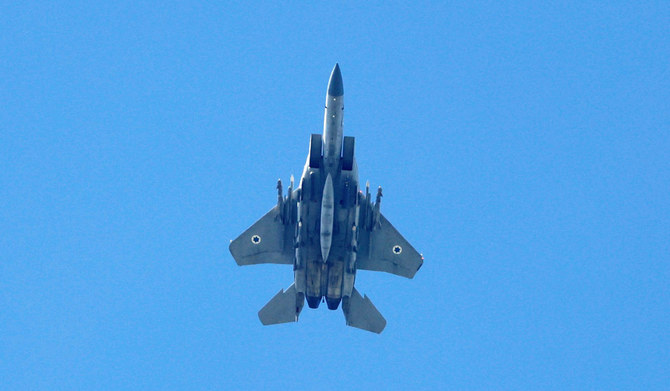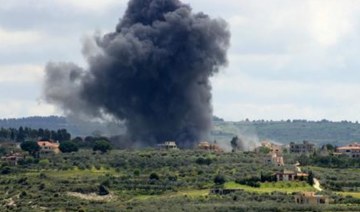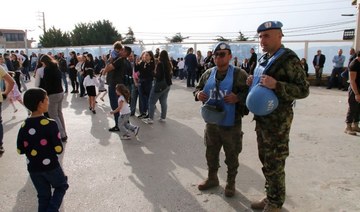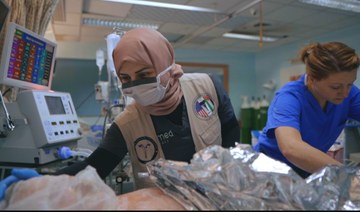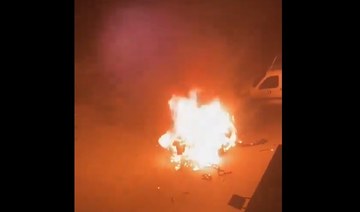BEIRUT: UN officials said on Monday that six months of conflict between the Israeli military and Hezbollah along the border between Israel and Lebanon must end, as they called for deescalation of the violence “while there is still space for diplomacy.”
The appeal on Monday by the UN’s special coordinator for Lebanon, Joanna Wronecka, and the commander of its peacekeeping mission in Lebanon, Aroldo Lazaro, came as an Israeli strike killed three people, including a field commander from Hezbollah’s elite Radwan Force, in Al-Sultanya, a village in southern Lebanon.
“The unrelenting cycle of strikes and counterstrikes in breach of the cessation of hostilities constitute the most serious violation of Security Council Resolution 1701 since its adoption in 2006,” they said.
Resolution 1701, adopted 18 years ago with the aim of resolving the war at the time between Israel and Hezbollah, called, among other things, for all hostilities between the two sides to cease.
“The gradual expansion in the scope and scale of the confrontations well beyond the Blue Line (the line of demarcation, set by the UN, between Lebanon and Israel) significantly raises the risk of miscalculation and further deterioration of an alarming situation,” the UN officials continued.
“It is six months since the exchanges of fire across the Blue Line began and they continue unabated, taking a heavy toll on both sides. The violence and suffering has gone on too long. It must stop. We urgently appeal to all sides to recommit to the cessation of hostilities, under the framework of Resolution 1701, and avail of all avenues to avoid further escalation while there is still space for diplomacy.
“It is also imperative to focus anew on the overarching objective of a permanent ceasefire and long-term solution to the conflict. A political process, anchored in the full implementation of Resolution 1701, is now more crucial than ever to address the root causes of the conflict and ensure long-term stability. The United Nations stands ready to support such efforts.”
Also on Monday, Hezbollah said it carried out “a drone attack on a naval military site at Ras Al-Naqoura, directly hitting its target.” The group said its operation coincided with a “military drill carried out by the Israeli army along the northern coast and in Western Galilee.”
Israeli media outlets confirmed a drone packed with explosives launched from Lebanon had landed in the area around the city of Ras Al-Naqoura in western Galilee but gave no further details.
The attack came hours after an Israeli drone attack killed three members of Hezbollah in Al-Sultanya. The group identified two of the dead as Ali Ahmad Hussein, a field commander of its elite Radwan Force who was born in 1984 in Beirut, and Ahmad Amin Chamseddine, born in 1990 in Markaba.
In a separate incident, Hezbollah said member Abdel Amir Hassan Halawi, born in 1976, died as a result of an attack by Israeli forced on a house in Kfarkila.
After the drone attack on Ras Al-Naqoura, the Israeli army immediately resumed its shelling of Lebanese towns and villages across the border, including Khiam, which has been subjected to bombardment for several days. The Israeli army said fighter jets had targeted a military compound in Khiam used by the Radwan Force, and bombed a Hezbollah military command center in Toura.
In addition, a two-story building in Al-Sultanya, Bint Jbeil, was reportedly hit by artillery fire, destroying it, and commercial buildings were bombed. Bodies were said to have been pulled from the rubble.
A spokesperson for the Israeli army confirmed: “Israeli forces conducted a military exercise on Monday morning along the northern coastal strip and in the western Galilee region, as part of the readiness of the Israeli army to fight on various fronts.”
According to Israeli news reports, the exercise encompassed Israel’s entire northern region command and all other branches of the military active in the area.
The exercise “simulates all scenarios and operational plans of the Israeli army for a comprehensive war in Lebanon, including a scenario in which Hezbollah initiates an attack and a scenario in which Israel initiates an attack,” the spokesperson said.
The army said that with the exercise, “another phase of the Northern Command’s readiness for war” on the Lebanon front was complete.
The Association of Muslim Scholars in Lebanon, which is affiliated with Hezbollah, described the Israeli announcement as merely an attempt to boost morale.
“If put to the test, this unrealistic claim will undoubtedly result in a painful blow (to the enemy) that has not been experienced before,” the association said.
“Hezbollah’s downing of an Israeli Hermes 900 drone on Sunday, which is the most advanced in Israel’s drone arsenal, was a painful blow,” it added, which would “deter Israel’s drone arsenal from further attacks as it will be vulnerable to being shot down.”



